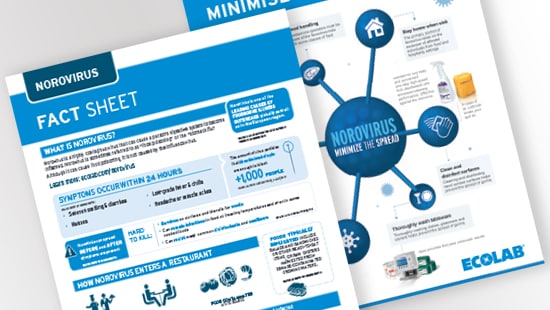Norovirus: What's New What's True and What To Do

Norovirus is a highly contagious virus that can cause a person’s digestive system to become inflamed. Norovirus is sometimes referred to as “food poisoning” or the “stomach flu.” Although it can cause food poisoning, it is not caused by the influenza virus.
The WHO reports that norovirus is one of the leading causes of foodborne illness outbreaks globally as well as in the European region1.
People who have norovirus often present with nausea, frequent and violent vomiting, stomach pain and/or diarrhoea. Other symptoms include low-grade fevers, chills, headaches, muscle aches and fatigue. Onset occurs in as little as 12 hours from exposure, but commonly takes 24 to 48 hours after ingesting the virus. The illness usually lasts one to two days, and in most cases, recovery occurs without problems unless the person becomes dehydrated from the illness. This is a higher risk in very young, elderly or immunocompromised persons.
Norovirus can be transmitted through the consumption of contaminated food or water, touching contaminated people, objects or surfaces or even by breathing airborne virus particles. The virus is hard to kill and can survive on surfaces and utensils for weeks and this environment may serve as a source of new infections/outbreak.
According to the ECDC, many different food items have been associated with norovirus outbreaks. Raspberries and oysters have caused several national and international outbreaks. In principle, any food item may become contaminated if handled by an infected person or if washed or humidified with contaminated water. Norovirus infections spread very effectively from person to person in community settings like lodging, hospitals, schools, day care centres and nursing homes. Several outbreaks have been recorded on cruise ships, which provide an ideal closed setting for the spread of infection2.
Norovirus has a significant impact on businesses. The potential for staff shortages, productivity and production losses as well as pressure and costs on the health and social care services are significant. Fortunately, there are a number of important measures that businesses can take to reduce the risk of a norovirus outbreak. Here are our tips to help reduce the risk of spreading norovirus:
- Stay home when sick and for at least three days after recovery
The primary control of norovirus relies on the exclusion of ill individuals from food and hospitality settings. Food handlers who have recently recovered from norovirus illness should be given non-food handling tasks.
- Clean and disinfectant surfaces
Clean and disinfect hard contact surfaces especially those handled more frequently, using BPR registered products effective against norovirus.
- Thoroughly wash tableware
Thoroughly washing dishes, glassware and utensils helps prevent the spread of germs especially as the virus can survive on surfaces and utensils for weeks.
- Avoid others who are sick
Limit contact with others who are sick as norovirus is a highly contagious virus and can be transmitted by touching contaminated people, objects or surfaces or even by breathing airborne virus particles.
- Wash your hands frequently
Hand hygiene is critical to help prevent and control virus outbreaks. This is a primary transmission mode and must be judiciously implemented. Washing well and often is the best control. Be sure to use BPR registered products effective against norovirus.
- Food handling
Food handlers and foodservice operators must be aware of the norovirus risks with some classes of foods.
To download our latest norovirus materials and additional information on how Ecolab can help you prepare for a possible norovirus outbreak please visit our webpage.
Additional information is also available through the European Centre for Disease Prevention and Control (ECDC) website.
Sources:
1WHO Estimates of the Global Burden of Foodborne Diseases. 2015.
2Source: https://ecdc.europa.eu/en/norovirus-infection/facts
Related Articles

NOROVIRUS RESOURCES
Click here to download our latest norovirus materials and additional information on how Ecolab can help you and your business prepare for a possible norovirus outbreak and minimise exposure.


